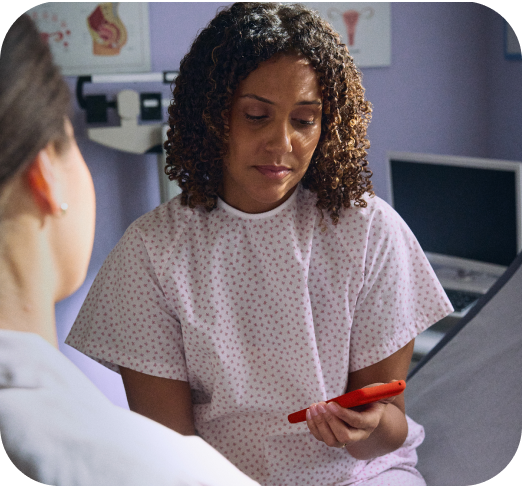If you’re having difficulties conceiving, we can help you understand what may be happening and find a fertility specialist (or reproductive endocrinologist, also known as an RE) who’s right for you.
When should you see a fertility specialist?
Younger than 35
35 and older

Common causes of fertility issues
Fertility declines naturally as women and men age.
- Between ages 20-30, a healthy woman has a 25% chance of getting pregnant naturally each month. After age 35, that drops to less than 10%
- The quality of a man’s sperm decreases with age, starting from around 35 years old
- In approximately 40% of cases, the male partner is either the sole or a contributing cause of infertility
Certain health conditions can affect fertility:
- Infrequent or irregular periods
- History of recurrent miscarriage (2 or more)
- Ovulation disorders or hormone imbalances like polycystic ovary syndrome (PCOS)
- Endometriosis
- Uterine growths (like fibroids or polyps)
- Blocked fallopian tubes or uterine disorders
- Diminished ovarian reserve and/or poor egg quality
- Poor sperm mobility
- Too few sperm
- Hormone imbalances
- Past or present testicular infections
- Testicular trauma
- Genito-urinary tract infections
- Varicocele, a condition which can affect the number or shape of the sperm
While not always a cause of fertility issues, lifestyle can sometimes play a role.
- Weight (being significantly under- or over-weight)
- Drug use
- Smoking and alcohol consumption
- Excessive physical or emotional stress
- Unhealthy diet (rich in processed meats, sweetened beverages, trans fats, etc.)
Diagnosis & treatments
First, you’ll need some tests. Then, you and your fertility specialist can discuss the right treatment options for you. We’ll cover the details so you feel informed and empowered every step of the way.
- Checks for hormonal abnormalities or potential genetic factors that can contribute to infertility
- Checks ovarian reserve
- Counts the number of follicles in the ovary (aka an antral follicle count)
- Checks the uterus and ovaries for abnormalities such as fibroids and ovarian cysts
- AKA “hysterosalpingogram test”
- Helps the doctor to check fallopian tubes for blockage and uterine cavity for abnormalities
- Checks the uterus for any potential abnormalities that could contribute to infertility
- Determines if the number, shape, and movement of the sperm is normal
Curious about male factor infertility? Take this assessment we’ve created in partnership with Posterity Health.
Some labs may provide at-home testing options, including Posterity Health and Labcorp OnDemand. You should consult your doctor about whether semen analysis is appropriate for you.*
*Ferring is not responsible for the consistency and accuracy of the information provided. A listing on this site does not constitute a referral, recommendation, or endorsement for any company listed.
- Can help determine if egg quality could be contributing to infertility and predict ovarian response to simulation
- Can also indicate conditions like polycystic ovary syndrome (PCOS), which may affect the ability to conceive
Some labs may provide test options you can purchase on your own, including Labcorp OnDemand. You should consult your doctor about whether an ovarian reserve test is appropriate for you.*
*Ferring is not responsible for the consistency and accuracy of the information provided. A listing on this site does not constitute a referral, recommendation, or endorsement for any company listed.

Find a fertility specialist
Use our finder tool to view different fertility clinics and help locate the right one for you.
This is not a complete list of all physicians in your area. Ferring is not responsible for the consistency and accuracy of the information provided. A listing on this site does not constitute a referral, recommendation, or endorsement for any physician or practice listed.
Free fertility coaching

All of our fertility coaches are certified, so you can feel confident knowing they’re trained to support you with expert guidance and real understanding. They’re here to anticipate your fertility needs and answer your fertility questions—even the ones you didn’t know to ask.
Free fertility coaching
Free fertility coaching
Understanding fertility treatment options
*Rates are age-dependent, and success was defined as the rate of live births per cycle.
Often the first fertility treatment, timed intercourse involves tracking and scheduling with the help of a doctor to narrow down a woman’s most fertile window for conceiving. Your doctor or fertility specialist uses blood tests and ultrasounds to ensure:
- A lead follicle is growing (maturing) to release
- The follicle is going through the various stages to develop into a mature egg
- Progesterone levels are changing, confirming ovulation took place
During OI, fertility drugs are used to stimulate one or multiple eggs, depending on the diagnosis, to grow and be released from the ovaries to help increase the chances for conception. This is performed in conjunction with either timed intercourse or IUI.
Usually, IUI is one of the first treatments your fertility specialist might recommend, after commonly used oral or injectable fertility medicines. During the procedure, sperm is placed directly into the uterus in order to bypass the cervix and place the sperm closer to the egg.
But while IUI is often less expensive, it only offers about an 8%—10% chance of pregnancy per cycle.
With IVF, sperm and eggs are combined outside the body in a laboratory. Fertilized eggs are grown into embryos which are then transferred into the uterus in hopes of achieving pregnancy. While IVF is the most effective fertility treatment option with a 48% success rate* for women younger than 35, it can also be more expensive.
*Success was defined in clinical data as live births per cycle.
The IVF process step by step
- COS aims to stimulate the ovaries to produce multiple eggs, increasing the chances of creating an embryo
- The doctor will prescribe fertility drugs to help support the growth of the follicles (which contain immature eggs)
- Once they reach the right size, a “trigger shot” will be given to mature the eggs for retrieval
- Sedation is provided before the doctor uses a vaginal probe to retrieve the eggs from the ovarian follicles
- This procedure typically takes less than an hour in the doctor’s office
Keep in mind… Your fertility specialist may prescribe progesterone any time between now and the embryo transfer to prepare the uterus for implantation and support pregnancy. This medication may be continued for 10 weeks after a positive pregnancy test.
- Sperm is typically collected via masturbation or a special condom used during intercourse
- Sperm is separated from the semen
- If no sperm is present in the semen, it may be obtained from the testicle
- Partner or donor sperm will be mixed with the eggs
- The fertilized eggs are kept in an incubator, where embryos develop and may be tested for certain genetic disorders before they are transferred
- The doctor will help decide how many embryos to transfer, balancing pregnancy chances with the possibility of multiples (twins or triplets)
- The selected embryo(s) will then be transferred into the uterus using a catheter
Common fertility-related surgeries:
Certain medical conditions, such as problems with your fallopian tubes, endometriosis, or fibroids, can cause fertility issues. In many cases, surgery can treat these problems, restoring your chance to conceive. And thanks to medical advances, most of these procedures are minimally invasive and have a short recovery period.
Here’s a list of common fertility-related surgeries:
- Laparoscopy: Sometimes used as a diagnostic tool, laparoscopy involves the insertion of a small, lighted camera into the pelvic cavity, which allows your doctor to check for things such as scar tissue, endometriosis, and blockages impacting the fallopian tubes and ovaries. If issues are discovered, your surgeon may use additional surgical tools to correct the problems.
- Operative hysteroscopy: In addition to being a diagnostic tool, a hysteroscopy can also be used to remove tissue or growths that interfere with fertility. Operative hysteroscopy can provide a view of fibroids, scar tissue, polyps, and abnormalities inside the uterine cavity.
- Myomectomy: Myomectomy refers to the removal of uterine fibroids and is sometimes called fibroidectomy. It’s often done through laparotomy (which is a major surgery—see below), but can sometimes be done via laparoscopy or hysteroscopy, which are less invasive.
- Laparotomy: If minimally invasive procedures are not feasible, your doctor may recommend laparotomy. This is a major surgery, performed under general anesthesia on an inpatient basis (which means you’ll be spending time in the hospital).

Get the most out of your appointment with your
fertility specialist
Your first appointment will last 1-2 hours, and you’ll probably talk to your fertility specialist or nurse about:
- Your/your family’s medical history
- Your sexual history
- How long you’ve been trying to conceive
- Potential treatment options
- Coverage and costs of fertility treatments
Your fertility specialist may also order/do a few tests, including:
- Blood tests
- A vaginal ultrasound
- A hysterosalpingogram (HSG)
- Semen analysis
Whether your appointment is in-person or virtual, we can help you prepare. Make sure you have these things ready:
- Call ahead of time to have your OBGYN send relevant medical records—like surgeries, recent Pap tests, and a list of any medications you take—over to your fertility specialist’s office
- Gather copies of any previous fertility workups you or your partner have had
- Have insurance information available for you and your partner
- Make a list of concerns/observations about your cycle
- Write down all of your questions and concerns before the appointment starts
- Have a support person with you on the call or at the in-person appointment as allowed by clinic guidelines
- Keep a paper and pen handy to write down notes
Haven’t started treatment yet? Here’s your discussion guide.


Preparing for parenthood, body and mind
From information on fertility specialists, to men’s fertility and more, you’ll find it here.
Why an OB/GYN and RE are important on your TTC team
Breaking down some common fertility traditions
How to find the right egg or sperm donor
Stay informed
We’ll send you information to help you understand fertility challenges and treatment options.